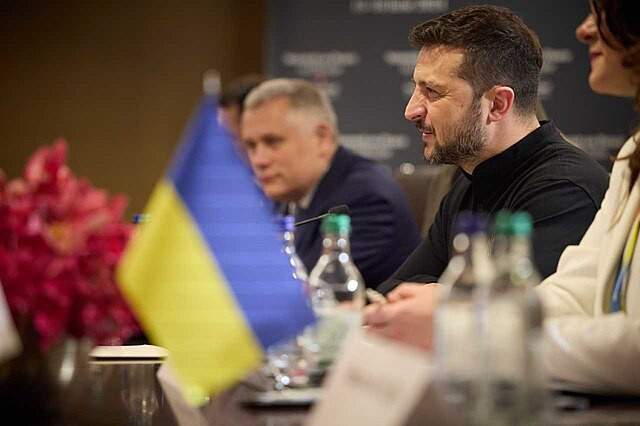The United States is reportedly softening its stance on Ukraine's bid to join NATO, marking a potential shift in support for Kyiv amid its ongoing conflict with Russia. According to French daily Le Monde, U.S. officials have indicated they "no longer have any objections in principle to a simple invitation" for Ukraine to join the alliance. The report comes as Kyiv steps up its calls for NATO membership, presenting it as the centerpiece of Ukraine's security and long-term strategy.
This development coincides with renewed support from the Group of Seven (G7) countries, which have backed Ukraine's "irreversible" path to full Euro-Atlantic integration, including NATO membership. During a meeting of G7 defense ministers in Naples, Italian Defense Minister Guido Crosetto emphasized the necessity for international cooperation to address global security issues, including the conflict in Ukraine. "The G7 must be like a gadfly that has the strength to sting the rest of the world," Crosetto said at a news conference.
The G7 defense ministers' meeting, held under Italy's 2024 rotating presidency, represented the first time G7 leaders dedicated a ministerial meeting solely to defense. Ministers discussed a range of international challenges, including the Russian advance in Ukraine, China's military activities around Taiwan, and the escalating tension on the Korean Peninsula. Alongside G7 members, representatives of NATO, the European Union, and Ukrainian Defense Minister Rustem Umerov also joined the talks.
In its final statement, the G7 expressed unequivocal support for Ukraine's NATO ambitions and warned of a "deteriorated security framework" worldwide. "Tensions have been fueled by confrontation between two different, perhaps incompatible visions of the world," Crosetto noted, reflecting on the broader geopolitical implications of the Ukraine-Russia conflict. German Defense Minister Boris Pistorius echoed these sentiments, highlighting concerns about North Korea's reported support for Russia's war effort.
Back in the United States, the potential shift in Washington's position on Ukraine's NATO membership follows mounting pressure from Ukrainian President Volodymyr Zelensky. Kyiv has long sought a clear pathway to joining NATO, and Zelensky has listed membership as a key component of his "victory plan" for Ukraine. During a recent visit to Belgium, Zelensky underscored Ukraine's dire need for security guarantees, stating that the country faced the choice of "nuclear weapons or NATO membership." He later clarified that Ukraine has no intention of pursuing nuclear armament, instead emphasizing that NATO membership offers the "strongest security guarantee."
House Representative Gerry Connolly, head of NATO's Parliamentary Assembly, voiced support for Ukraine's aspirations, stating, "President Biden was-and still is-sympathetic to Ukrainian aspirations, including NATO membership." However, Connolly also stressed the need for coordination among NATO allies before any official move can be made. "I understand a certain haste and impatience on the part of Ukrainians," Connolly said, acknowledging Kyiv's urgency while advocating for a collective decision among NATO members.
The renewed momentum for Ukraine's NATO bid has garnered further endorsement from the G7. In its joint statement, the G7 reiterated its support for Kyiv's "irreversible path to full Euro-Atlantic integration." This backing came amid concerns about the spread of the Russia-Ukraine conflict to other parts of the world, with Pistorius warning that North Korea's involvement could escalate the situation further. The G7 also expressed unease over China's support for Russia and recent military exercises around Taiwan.
While Western support for Ukraine's NATO ambitions appears to be gaining traction, Zelensky expressed apprehension about what future support might look like after the upcoming U.S. elections. With Vice President Kamala Harris set to run against former President Donald Trump in the November election, Ukrainian officials have expressed hope that Biden's administration might take decisive steps toward advancing Ukraine's membership bid before the transition period.
The G7 meeting also addressed the ongoing conflict between Israel and Hamas, with ministers calling for an immediate ceasefire in Gaza and the release of Israeli hostages still held by Hamas. Italian Prime Minister Giorgia Meloni, who had recently visited Lebanon and Jordan, voiced her concerns over the rising tensions in the Middle East. "The conflict between Israel and Hamas risks fueling uncontrollable escalation," she warned, echoing the G7's concerns over the situation's potential global ramifications.
Defense Secretary Lloyd Austin spoke about the recent attacks on U.N. peacekeepers in Lebanon, urging Israel to scale back strikes in Beirut. He added that Israel had assured him that it had no intention of targeting U.N. forces stationed along the demarcation line between Israel and Lebanon. Italy, as a major contributor to the U.N. peacekeeping mission in Lebanon, remains deeply concerned about the impact of Israeli strikes, which have sparked anger in Rome.






